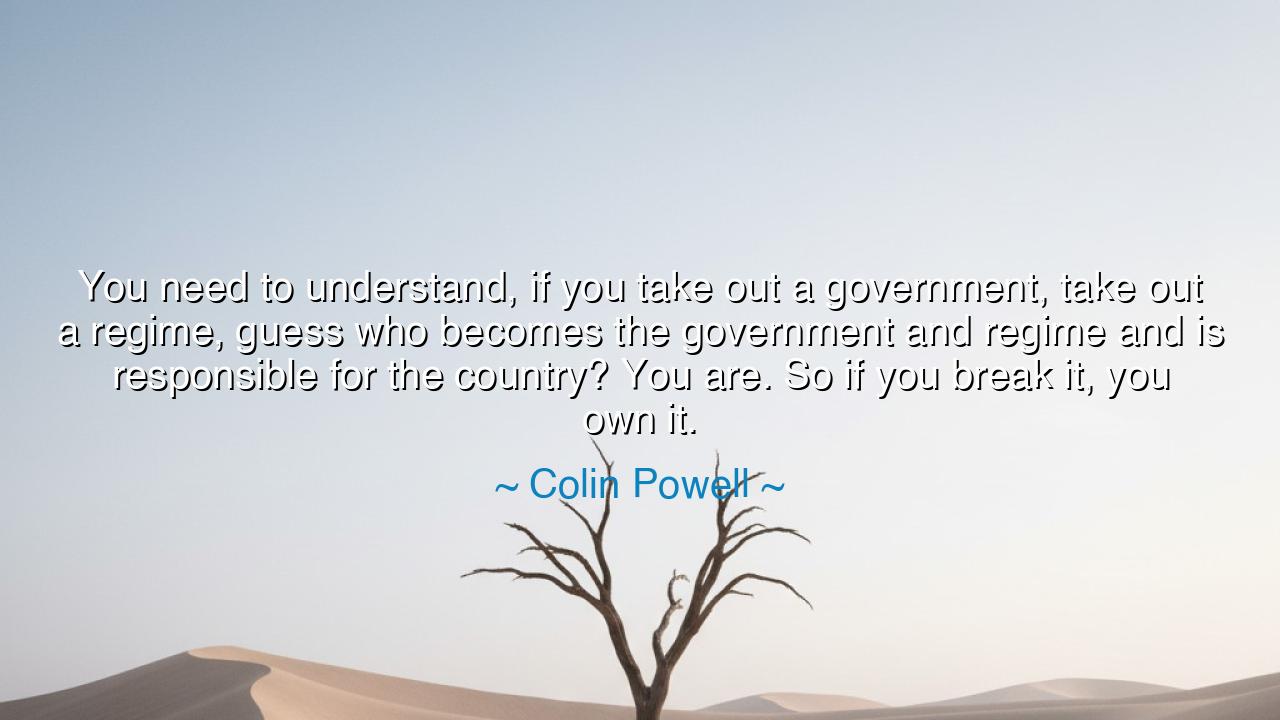
You need to understand, if you take out a government, take out a
You need to understand, if you take out a government, take out a regime, guess who becomes the government and regime and is responsible for the country? You are. So if you break it, you own it.






In the wake of wars and shifting empires, when nations stood upon the edge of ambition and uncertainty, Colin Powell, a soldier tempered by both victory and restraint, spoke with the solemnity of one who had seen the full measure of war’s cost: “You need to understand, if you take out a government, take out a regime, guess who becomes the government and regime and is responsible for the country? You are. So if you break it, you own it.” These words, forged in the crucible of military wisdom, were not the counsel of fear but of foresight — a warning to those who wield power without understanding the burden it brings.
The origin of this quote traces to the time before the invasion of Iraq in 2003, when Powell, then the U.S. Secretary of State, sought to caution his nation’s leaders. He reminded them that the destruction of a regime is not the end of war, but the beginning of responsibility. This truth, known thereafter as the Powell Doctrine or the Pottery Barn rule — “if you break it, you own it” — speaks to a moral law as ancient as humanity itself: that those who unleash chaos must also bear the duty of restoration. For power divorced from accountability becomes not liberation, but folly.
In the annals of history, this warning has been written and rewritten in blood. When Napoleon marched across Europe, toppling thrones in the name of progress, he believed he could rebuild nations in his image. Yet every government he shattered became a burden he could not bear. France’s triumph turned to exhaustion, and the emperor who once sought to rule the world found himself surrounded by ruins of his own making. The same truth echoed in the ruins of Baghdad, when a regime fell swiftly but the peace that followed was harder to win. The destruction of tyranny did not bring order — it brought the storm. For when one removes the head of a nation, the heart does not immediately learn to beat again.
Powell’s wisdom flows from this eternal recognition — that governance is not conquest, but stewardship. To “own” what one has broken means to assume the long, weary work of rebuilding lives, restoring trust, and renewing stability. It is not enough to overthrow; one must also understand. It is not enough to free; one must also guide. To destroy without rebuilding is to play god with the destiny of others, and to inherit the ruins of one’s own hubris. As the ancients said, “He who would rule must first serve,” for every act of power carries with it a sacred responsibility.
This truth does not dwell only in the halls of war. It speaks to the smallest realms of human life — families, communities, relationships. When we tear down another’s trust, when we disrupt what is fragile, when we wield authority carelessly — we too “own” what we have broken. The law of consequence is not bound to politics alone; it governs the soul. Destruction, whether of a nation or a heart, is always the beginning of obligation. For the hands that shatter must also be the hands that heal.
The lesson of Powell’s words, then, is one of humility and foresight. Before we act — whether as individuals or as nations — we must ask: “Am I prepared to bear what follows?” It is easy to unmake; it is hard to sustain. The wise do not rush into the work of destruction, for they see beyond the victory of the moment to the toil of the years that follow. True strength is not found in breaking, but in building — not in toppling what is flawed, but in patiently shaping what may yet endure.
So, my children of the future, carry this teaching as a lantern in your judgment: think before you strike. Whether in anger, in ambition, or in the name of justice, know that every act that tears must also bind, every force that wounds must also mend. Nations, like souls, are delicate vessels — easy to shatter, slow to restore. To wield power is to inherit burden; to break is to become a builder.
And remember always the solemn wisdom of Colin Powell: “If you break it, you own it.” For the world does not forgive those who destroy without care, but honors forever those who, having shattered, stay to rebuild.






AAdministratorAdministrator
Welcome, honored guests. Please leave a comment, we will respond soon